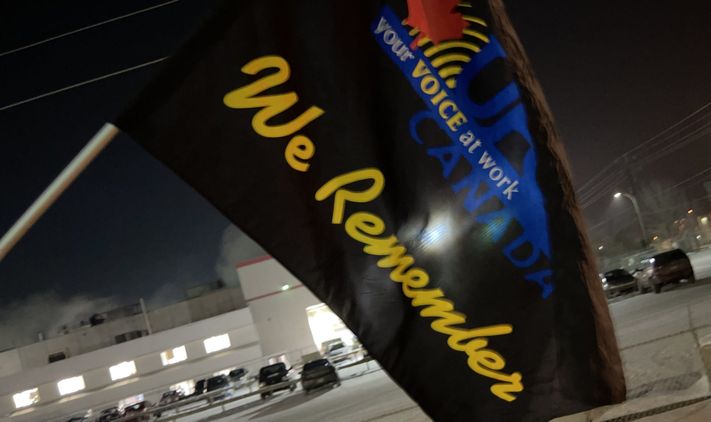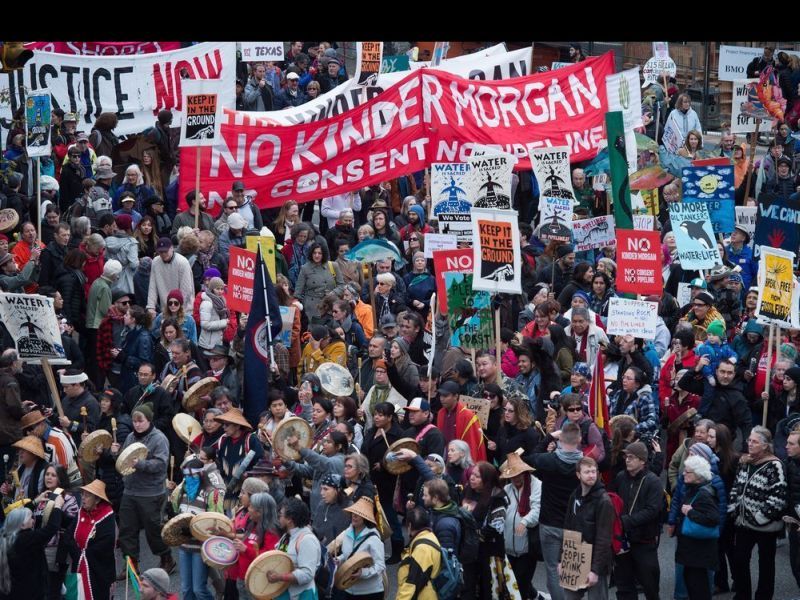On January 28, Darwin Doloque, a 35-year-old Filipino worker, died from COVID-19. He was employed at the Olymel slaughterhouse in Red Deer in Alberta. Other workers from the slaughterhouse describe the fear of going to work, which they experience daily, as well as fear of reprisal for speaking out. At the peak in February there were 200 active cases at the workplace out of 455 total cases, more than half of the workforce. Hopefully, these affected workers will not experience long-term detriments to their health, and that community spread will be minimal.
Finally, on February 15, the slaughterhouse decided to shut down – which would take a few days to complete – but they had denied the necessity of doing so up to then. Alberta Health Services and the provincial government stated that closure was not required – even though AHS confidentially admitted one in five workers was infected and there had been an outbreak since mid-November and the plant had been inspected 14 times! Olymel only agreed to shut down the plant thanks to pressure from the union – namely, taking a confidential letter from AHS and workers’ stories to the media. Perhaps the union should have walked out of the infected plants, rather than just applying pressure. While Albertans cannot count on their government to shut down unsafe workplaces, at least pressure from organized labour can get the job done.
We have seen time and time again the velvet-glove treatment given to super-spreading big business, while small business owners face harsh restrictions and closures despite a lack of evidence that they are a major source of transmission. The UCP’s misdirected strategy required small businesses to shutter from early December to February 8, affecting thousands of restaurant and hospitality workers, and those in other service sectors.
Slaughterhouses and meatpacking plants have proven to be extremely unsafe. Cargill’s High River plant had the largest outbreak of COVID in Canada: at least 950 workers tested positive and the resulting community spread was over 1,500 cases. Immigrant communities are especially vulnerable since they comprise the majority of the workforce in these jobs. Between 60 to 80 percent of the Cargill workforce are part of the Filipino community, who are often part of the Temporary Foreign Workers’ program, which is used to obtain cheap and highly exploitable labour. Profit is boosted through unsafe work conditions and immigrant workers are fearful of speaking out lest they be sent back to their home country.
In November, Premier Kenney chose to blame the second-wave spread – that is, the increased spread, which directly preceded the December restrictions – directly on the South Asian community. “We know that it’s a tradition to have big family gatherings at home and we think this is one of the reasons why we have seen a much higher level spread in the community than other parts of the population.”
Apparently, the Premier was unaware that unsafe workplaces have been such a large part of the province’s transmission! The fact is, most Albertans are actually doing their part to reduce the spread and understand that appropriate measures need to be taken to deal with the pandemic. Does he not realize that members of immigrant communities are more likely to work in essential services and potentially unsafe jobs? Or perhaps he sought to obfuscate the truth and provide a scapegoat so big businesses could keep their machines running.
The evidence indicates that COVID transmission cannot be attributed to Albertans’ lack of “personal responsibility,” because they’re already assuming it. However, it can certainly be attributed to unsafe workplaces. There are households where long-term care workers live with meatpacking workers affected by the Cargill and Olymed outbreaks. If the Premier is looking for community spread, he needs to realize that it’s an outgrowth of super-spreaders like Cargill and Olymel.
In November, while workplaces were spreading COVID, the UCP legislated Bill 47, which limits the right to refuse unsafe work (they spent all of 2020 passing anti-worker legislation). Alberta’s government is more concerned with protecting corporate profits than protecting public health. The health of Albertans requires a government that realizes that the interests of private profit are contrary to the general well-being of everybody else. Industry ought to be the means by which people secure livelihoods and produce necessary goods and services for all.
Workers need safe workplaces where they have democratic control, and the broader communities need not suffer the fallout of big businesses’ disregard for costs paid by society and environment, what economists call externalities.
Socialist Alternative calls for:
- Immediate shutdown of all super-spreading production plants, with financial relief and job protection for affected workers.
- Hazard pay, and sick pay for all workers. Direct control of workplace safety by workers.
- Reversal of all anti-worker legislation enacted by the UCP government – including the right to refuse unsafe work – to be replaced with pro-worker and pro-union legislation.
- Justice and solidarity among workers, whether migrants or Canadian. End cheap labour with full labour, human, and citizenship rights for all migrant workers in Canada.
- Public ownership of the food production and food distribution industry.
- End profiteering from care homes, taking all long-term care facilities into public ownership.
- End corporate domination. Take into public ownership the commanding heights of the economy, the big corporations, banks and financial institutions that dominate the economy, to be run under democratic workers’ control and management.
An organized mass movement of the multi-racial working class can win these demands.




